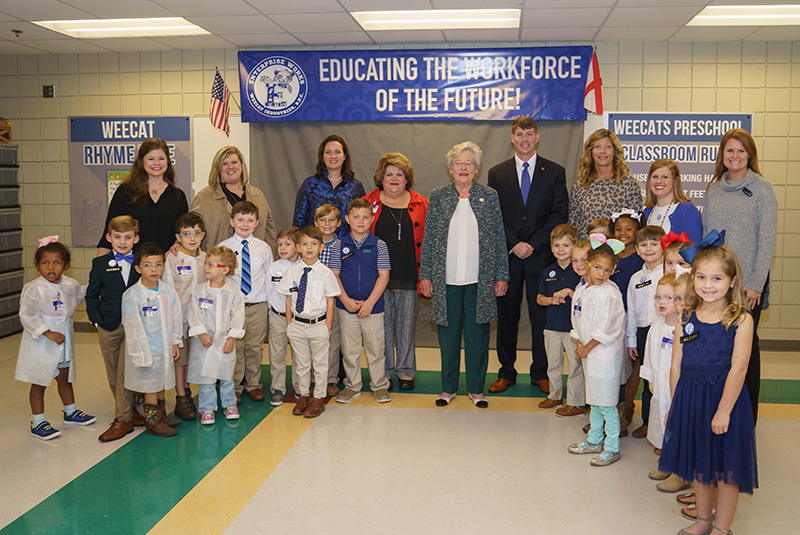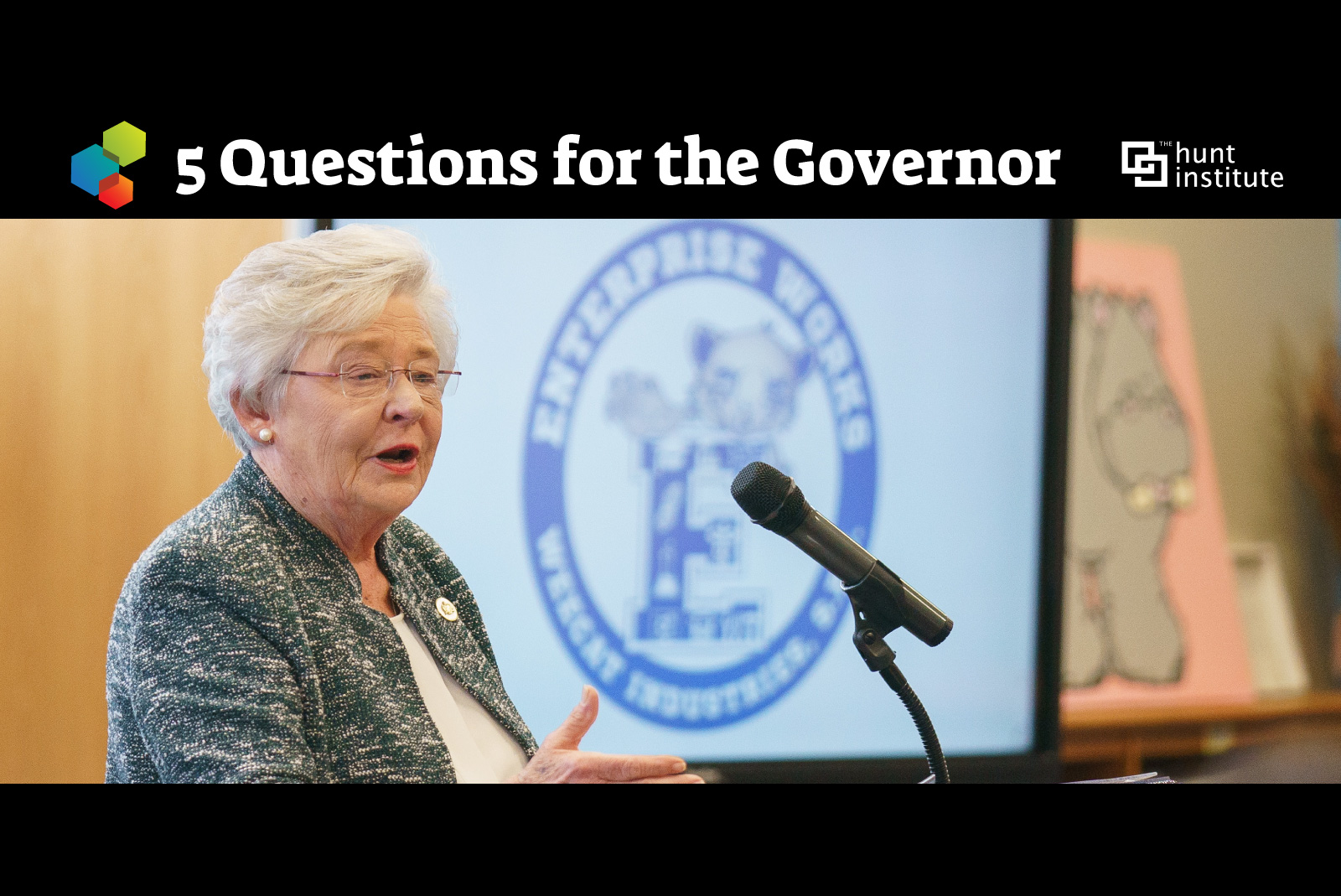Where do you go for the top news in Early Learning at the state level? Check out “5 Questions for the Governor,” where we’ll explore the top Early Learning challenges and successes in states across the nation. We’re thrilled to partner with The Hunt Institute on this series. Read them all.
1. COVID-19 has obviously been the big story of 2020. What part of Alabama’s response to the pandemic has made you most proud?
The pandemic has been one of the most challenging times in the history of the State of Alabama. However, it has also been one of our state’s finest hours. By following social distancing, wearing face coverings when social distancing is not possible, and following common-sense steps such as washing hands, Alabamians are balancing the equally important tasks of keeping our economy and schools open while also taking every step possible to reduce spread of the virus in Alabama.
I am most proud of how the people of Alabama have handled these trying times. Alabamians have understood the necessity of our public health response measures, which has allowed us to rely on the good sense and love for one another that is characteristic of the people of Alabama, and to keep our economy open and keep the new cases as low as possible. Times of great adversity often bring out the best in Alabamians, and that has been true on innumerable occasions since March.
2. You’ve identified an integrated education-to-workforce initiative, Strong Start, Strong Finish, as a cornerstone to your agenda. Why is this a critical issue for you as Governor and how does the plan address it?
In the 1970s, two-thirds of Alabama’s in-demand jobs required a high school education or less. Today, two-thirds of Alabama’s in-demand occupations require some form of postsecondary education. My Strong Start, Strong Finish initiative is designed to connect early childhood development efforts that promote parents as a child’s first and best teachers to K-12 education initiatives, such as the Campaign for Grade-Level Reading and the Alabama STEM Council, that are designed to ensure that students are literate and numerate by the age eight.
 These efforts are followed by a focus on new-era career and technical education initiatives, such as computer science, work-based learning, dual enrollment, and competency-based learning, that connect career and academic pathways for all students. The Strong Start, Strong Finish Initiative culminates in the Success Plus postsecondary education attainment goal that is focused on credentialing an additional 500,000 Alabamians with barriers to education and workforce training, with a focus on equity, by 2025. Connecting education and workforce initiatives is key to increasing Alabama’s postsecondary education attainment rate and the state’s labor force participation rate by preparing Alabamians with the skills they need to fill the two-thirds of today’s in-demand jobs that require postsecondary education.
These efforts are followed by a focus on new-era career and technical education initiatives, such as computer science, work-based learning, dual enrollment, and competency-based learning, that connect career and academic pathways for all students. The Strong Start, Strong Finish Initiative culminates in the Success Plus postsecondary education attainment goal that is focused on credentialing an additional 500,000 Alabamians with barriers to education and workforce training, with a focus on equity, by 2025. Connecting education and workforce initiatives is key to increasing Alabama’s postsecondary education attainment rate and the state’s labor force participation rate by preparing Alabamians with the skills they need to fill the two-thirds of today’s in-demand jobs that require postsecondary education.
We are coupling our focus on systems alignment with an intentional focus on developing the infrastructure needed to support competency-based learning, short-term workforce training programs that articulate to traditional two- and four-year degrees, and a skills-based hiring ecosystem. The COVID-19 pandemic accelerated the timetable for the future of work. It is incumbent on governors to provide the infrastructure to prepare their citizens for the work of today, which is the work of the future.
3. Alabama’s First Class Pre-K program is nationally recognized and one of only four states to meet all 10 of the National Institute for Early Education Research’s quality standards benchmarks. Alabama has also dramatically increased the number of children served during your tenure. What do you attribute the state’s success?
Alabama’s First Class Pre-K program has had the great fortune of meeting all 10 of the National Institute for Early Education Research’s quality standard benchmarks for 14 consecutive years. This success is attributed to the support of the Alabama Legislature and stable leadership at the Alabama Department of Early Childhood Education that has placed a premium on maintaining quality, even as access to the First Class Pre-K program has increased markedly. The program has grown from serving 1.7 percent of Alabama’s four-year-old children in 2005 to serving 38 percent in 2020. In the same time period, the budget for First Class Pre-K has grown from $4.3 million to $128.8 million.
A 2018 study conducted by the University of Alabama at Birmingham (UAB) School of Public Health, the UAB School of Education, and the Public Affairs Research Council of Alabama demonstrated that students who participate in First Class Pre-K are more likely to be proficient in math and reading, with no evidence of fade out of the benefits of high-quality pre-k over time. We are getting closer to our goal of offering First Class Pre-K to all of the families in Alabama who wish to participate, which is expected to equal about 70 percent of our four-year-old children.
4. As mentioned, the First Class Pre-K program is enjoying tremendous success, what can you tell us about the extension for infants and toddlers – First Class Foundations?
Our approach is focused on connecting the earliest stages of learning through a continuum of early childhood development. Through an innovative partnership between the Alabama Department of Human Resources and the Alabama Department of Early Childhood Education, First Class Foundation Sites are located at licensed child care programs. First Class Foundation Sites bring the high-quality expectations of First Class Pre-K to infant and toddler classrooms.
Selection as a First Class Foundation Site yields funding for program enhancements, coaching, professional development opportunities for the staff, and support for attaining a higher quality rating in the Alabama’s childcare quality rating system. The goal of the First Class Foundation Sites is to support high-quality standards for children from birth to age 5. Sites have been selected through a competitive application process. All participating First Class Foundations Sites operate an infant and toddler program as well as an Alabama First Class Pre-K classroom and maintain a current childcare license with the Alabama Department of Human Resources.
5. As early education continues to be one of your highest priorities, what is your hope for families in your state?
My hope is that families feel supported to be their children’s first and very best teachers. My administration is supporting a two-generation approach to early childhood education and development that empowers families with the information and resources they need to ensure that every child is pre-k ready, ready for kindergarten, and literate and numerate by age eight. The first eight years are precious, and we do not have any time to waste, or recover, when it comes to ensuring that all of our kids reach each of those development benchmarks.
As a critical component of the Strong Start, Strong Finish education initiative, I formed the Alabama Campaign for Grade-Level Reading to establish local campaigns for grade-level reading in February 2018. On July 10, 2020, I announced the release of the final report and recommendations of the Alabama Campaign for Grade-Level Reading, entitled The Alabama Campaign for Grade Level Reading Recommendations to the Governor.
The Alabama Campaign for Grade-Level Reading will now morph into 67 local campaigns through the statewide network of the Children’s Policy Councils. This approach will allow Alabama’s 67 Children’s Policy Councils to address external issues outside of the classroom, such as childhood health, access to nutritious food, and quality after-school and summer programs that directly affect a child’s ability to perform academically. We will continue to promote opportunities to amplify the work of our communities as we prepare each Alabamian to have a strong start and a strong finish to their educational journey and career pathway.



